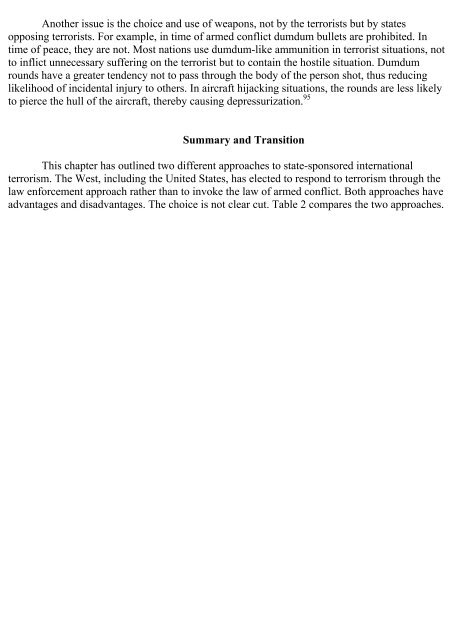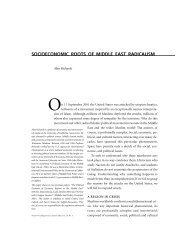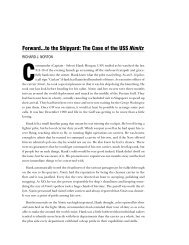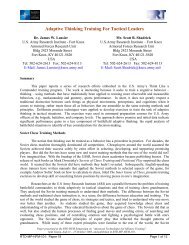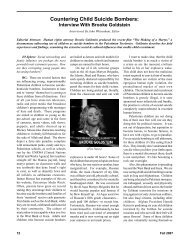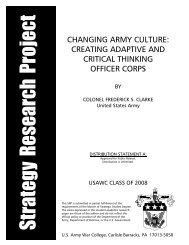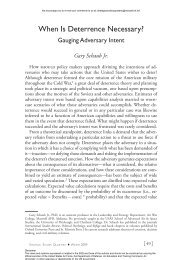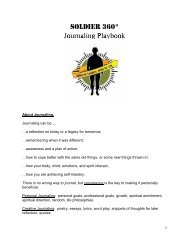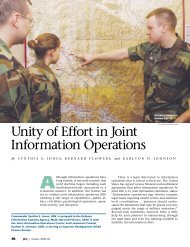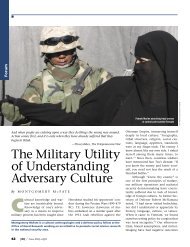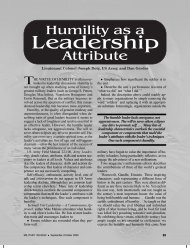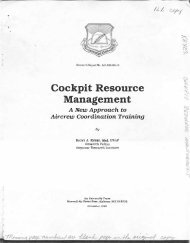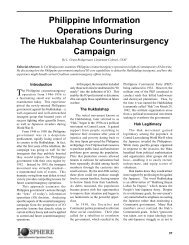- Page 2 and 3:
LEGITIMATE USE OF MILITARY FORCE AG
- Page 4 and 5:
CONTENTS Page Disclaimer ii Forewor
- Page 6 and 7:
Chapter 7 USE OF MILITARY FORCE: TE
- Page 8 and 9:
ABOUT THE AUTHOR Lt Col Richard J.
- Page 10 and 11:
INTRODUCTION THE RELEVANCE OF INTER
- Page 12 and 13:
Chapter 7 summarizes the lessons le
- Page 14 and 15:
This Study, How Meaningful? States
- Page 16 and 17:
The international arena has seen so
- Page 18 and 19:
Combating terrorism accents this is
- Page 20 and 21:
7. Many scholars and jurists have f
- Page 22 and 23:
Jenkins, “Combatting Terrorism Be
- Page 24 and 25: Thoughts toward an International Co
- Page 26 and 27: 29. See Vice President, Report on C
- Page 28 and 29: CHAPTER 1 WHAT IS TERRORISM AND HOW
- Page 30 and 31: If a general definition would be so
- Page 32 and 33: Terrorism is the unlawful use or th
- Page 34 and 35: International Terrorism: A Working
- Page 36 and 37: there is evidence that President Id
- Page 38 and 39: The Vice President’s Task Force o
- Page 40 and 41: A Threat More Serious Than Numbers
- Page 42 and 43: Diplomatic relations between countr
- Page 44 and 45: And what has the challenge become?
- Page 46 and 47: physically or by neutralizing their
- Page 48 and 49: 27. UN General Assembly, resolution
- Page 50 and 51: 44. L. C. Green of the University o
- Page 52 and 53: 65. Information provided by L. Cart
- Page 54 and 55: 105. See Stephen Sloan, Beating int
- Page 56 and 57: The law of armed conflict approach
- Page 58 and 59: But, as regards terrorism, the arme
- Page 60 and 61: 1. If the law of armed conflict is
- Page 62 and 63: Although both approaches, law enfor
- Page 64 and 65: crime involved. This initiative has
- Page 66 and 67: Symbionese Liberation Army (SLA) wa
- Page 68 and 69: eaches, prosecution, and extraditio
- Page 70 and 71: the latter instance, no one claimed
- Page 72 and 73: international law establishing indi
- Page 76 and 77: NOTES 1. Department of State, “Li
- Page 78 and 79: 28. Paul A. Tharp, Jr., “The Laws
- Page 80 and 81: 1919 a process has been under way t
- Page 82 and 83: 66. See Geneva Convention IV, artic
- Page 84 and 85: CHAPTER 3 STATES HAVE RESPONSIBILIT
- Page 86 and 87: International Terrorism and the Dut
- Page 88 and 89: government exercises within its ter
- Page 90 and 91: few states, although they do not vi
- Page 92 and 93: to establish the linkage required u
- Page 94 and 95: chapters 4-6 examine the second. Te
- Page 96 and 97: all Members shall refrain in their
- Page 98 and 99: valuable tools of self-help and of
- Page 100 and 101: object the removal or destruction o
- Page 102 and 103: 10. Jordan J. Paust, “Entebbe and
- Page 104 and 105: 34. See “Terrorism’s Grim Upsur
- Page 106 and 107: through activities that involve for
- Page 108 and 109: CHAPTER 4 INDIVIDUAL SELF-DEFENSE A
- Page 110 and 111: Strictly speaking, the right of ind
- Page 112 and 113: Clearly, however, states may not re
- Page 114 and 115: Although the degree of control that
- Page 116 and 117: The expansive school’s belief tha
- Page 118 and 119: What is the customary law on self-d
- Page 120 and 121: await the arrival on scene of an ar
- Page 122 and 123: Reasonable Response This element re
- Page 124 and 125:
Summary and Transition Individual s
- Page 126 and 127:
Security; Implications of Israel’
- Page 128 and 129:
In response to this line of reasoni
- Page 130 and 131:
American Society of International L
- Page 132 and 133:
Brownlie, “Use of Force,” 231.
- Page 134 and 135:
avoided if the focus is put properl
- Page 136 and 137:
The danger of conceding to individu
- Page 138 and 139:
Fifth, and finally, article 52, par
- Page 140 and 141:
12. See Rosalyn Higgins, “The Leg
- Page 142 and 143:
CHAPTER 6 OTHER LEGAL ARGUMENTS TO
- Page 144 and 145:
conditions necessary for invitation
- Page 146 and 147:
The action must be taken for a puni
- Page 148 and 149:
…Yet, essentially for reasons of
- Page 150 and 151:
The action must be necessitated by
- Page 152 and 153:
emained so once the operations were
- Page 154 and 155:
Perhaps the best ease for humanitar
- Page 156 and 157:
The state contemplating interventio
- Page 158 and 159:
Many have criticized the modern law
- Page 160 and 161:
NOTES 1. See J. E. S. Fawcett, ‘I
- Page 162 and 163:
27. Bowett writes, ‘‘Reprisals
- Page 164 and 165:
49. See Bowett, Self-Defence, 88. 5
- Page 166 and 167:
An International Journal 7, no. 2 (
- Page 168 and 169:
This study has considered each of t
- Page 170 and 171:
Piracy, which is limited to illegal
- Page 172 and 173:
NOTES 1. Joint Chiefs of Stall, Uni
- Page 174 and 175:
3. The action is taken to protect e
- Page 176 and 177:
Option 4: Collective Anticipatory S
- Page 178 and 179:
Option 8: Peacetime Reprisal Source
- Page 180 and 181:
8. The action is for a limited dura
- Page 182 and 183:
APPENDIX B UNITED NATIONS CHARTER (
- Page 184 and 185:
APPENDIX C STATUTE OF THE INTERNATI
- Page 186 and 187:
Crelinsten, Ronald D., Danielle Lab
- Page 188 and 189:
Almond, Harry E., Jr. “Using Law
- Page 190 and 191:
Clark, Roger S. “Humanitarian Int
- Page 192 and 193:
Harlow, Bruce, Lt Comdr, USN. “Th
- Page 194 and 195:
Livingstone, Neil C., and Terrell B
- Page 196 and 197:
Paust, Jordan 5. “Entebbe and Sel
- Page 198 and 199:
______. “Problems with the Applic
- Page 200 and 201:
Blum, Yehuda. State Terrorism and t
- Page 202 and 203:
“European Convention on the Suppr
- Page 204 and 205:
______. Arms Control and Disarmamen
- Page 206 and 207:
______. “Terrorist Attacks on US


